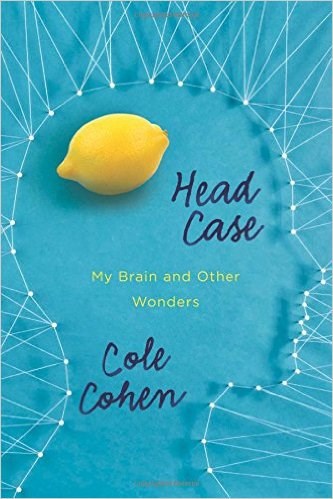Brains are fascinating. Neuroscientists are constantly learning new things about the human brain but so much is left unexplained. Tap into the variety, potential and mystery with these books.
• Head Case: My Brain and Other Wonders by Cole Cohen: Cohen always knew that something about her was unusual. Unable to do simple math, understand directions or have any sense of time, she found school and routines challenging. Supportive parents and sympathetic teachers attempted to diagnose her with a learning disability but nothing ever made sense. Amazingly, Cohen graduated from high school and got degree from a liberal arts college but after graduating, she floundered. She was fired from entry level jobs for not being able to charge customers correctly or use a calendar. Depressed and anxious, she finally saw neurologist at age 26 who discovered that Cohen has a lemon-sized hole in her brain. Cohen tells her story of struggle, diagnosis and adaptation with a sense of humour and brilliant insight. Her case is both medically stunning and deeply moving.
• How to Relax by Thich Nhat Hanh: Sitting down with this book is deeply relaxing. Zen master and prodigious author Hanh writes simply and eloquently. He says, “We already have calmness in us; we just need to know how to make it manifest.” This pocket-sized book includes instructions on how to become aware of your breath, slow down and be present, and get energy back into your body. Reading Hanh’s words and looking at drawings by Jason DeAntonis, I could feel my blood pressure drop and my breathing slow — excellent practices for people experienced and interested in starting a meditation practice.
• Struck by Genius by Jason Pagett and Maureen Seaberg: Padgett lived a regular but aimless life. He liked going to bars, working out and spending time with his friends. A violent mugging changed everything. It didn’t seem like he was very badly beaten. He went to the hospital and was told he had a bruised kidney and a concussion. He was discharged that night. But something critical in his mind had shifted. Pagett could suddenly see circles and geometric shapes in everything around him. He became obsessed with drawing these shapes and. through his drawings, he understood complex math. For four years, he stayed inside, alone, studying and drawing. One day, he suddenly he craved a Subway sandwich. Incredibly, sitting next to him at lunch was a physicist who asked Pagett about his drawings. This brief human contact catapulted him out of his hermit life and into a college math program. Pagett thrived in the world of academia; he deepened his understanding of math, made friends and met his wife. Pagett’s story emphasizes the fragility and beauty of life, and he reminds us that the capacity for tremendous suffering as well as discovering great truths lies within us all.
• To slow down your own thoughts, join us at the Terry Fox Library on Sept. 15 at 7 p.m. for Mindfulness for Stress Relief offered by Peace Tree Innovations. Register by calling 604-927-7999.
--A Good Read is a column by Tri-City librarians that is published on Wednesdays. Dana Ionson works at Port Coquitlam’s Terry Fox Library.



